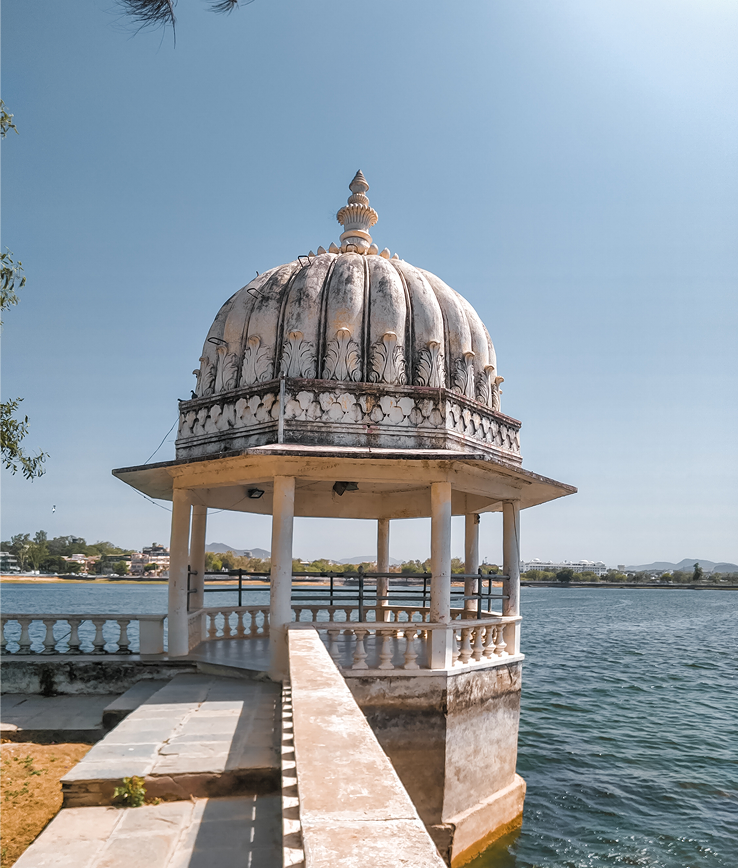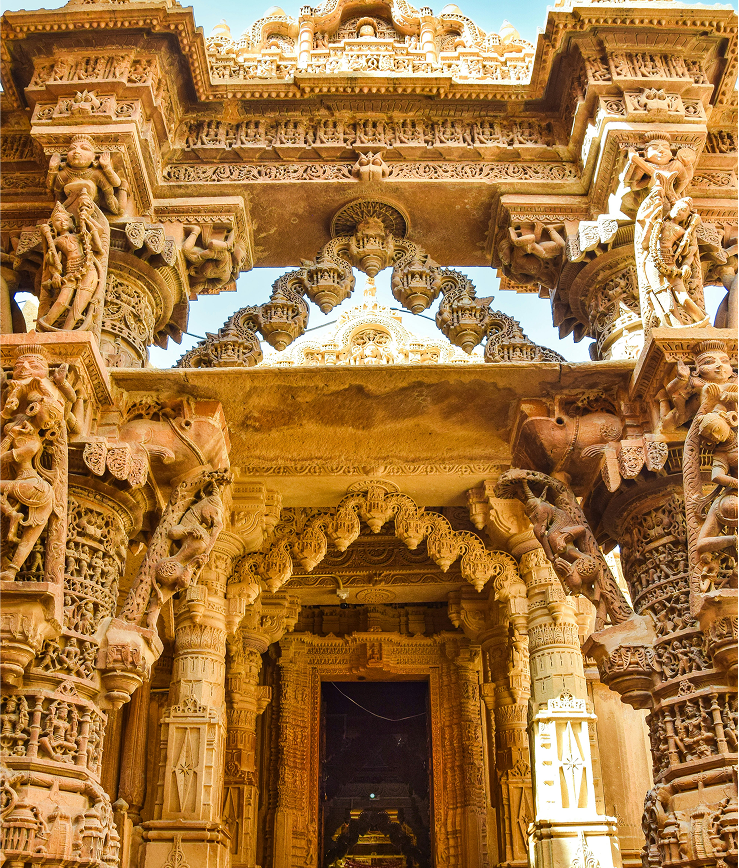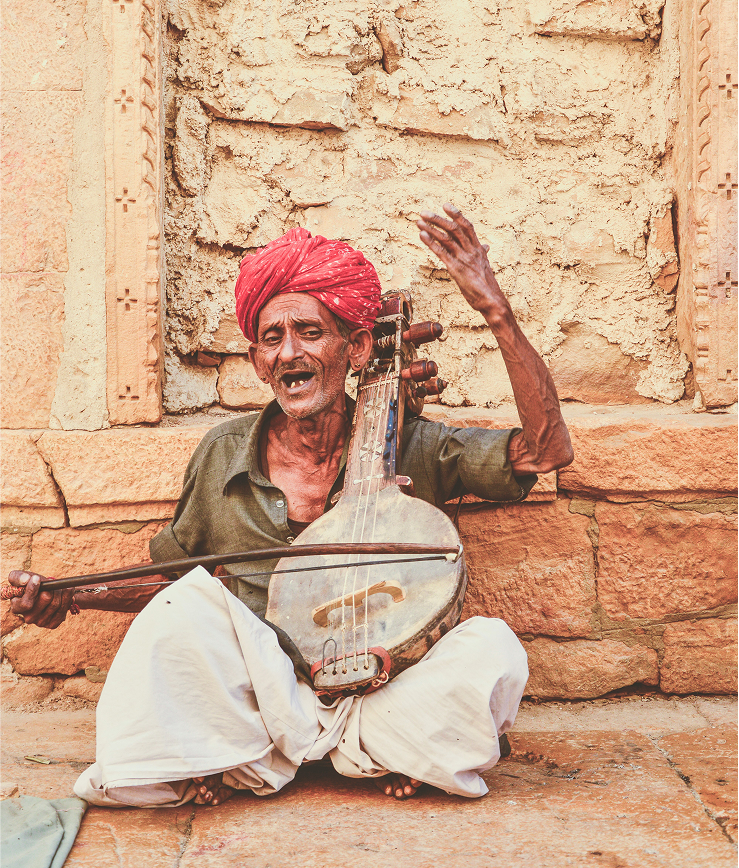Rajasthan Handbook for Vegan Travellers
Your Compassionate Guide to Exploring the Land of Royalty, Rhythm & Richness
Best Time to Visit
Rajasthan is best visited between October and March, when the desert heat mellows into crisp, pleasant days ideal for exploring forts, palaces, and bustling bazaars. This period also features some of the state’s most iconic festivals, including the Desert Festival in Jaisalmer and the Camel Fair in Pushkar. Summers are extremely hot, especially in the Thar Desert region, while monsoons bring brief relief but can disrupt rural travel.
Airport
The principal international gateway is Jaipur International Airport, with major domestic hubs in Udaipur, Jodhpur, and Jaisalmer. These airports connect Rajasthan seamlessly to India’s metros and select international cities. Facilities at most airports include lounges, vegan-friendly eateries, currency exchange, and transport services for onward travel.
Language
Hindi is the primary language, while Rajasthani dialects such as Marwari, Mewari, and Shekhawati are spoken across different regions. English is widely understood in urban centres, hotels, and tourist areas, ensuring easy communication for international travellers. Locals are warm and hospitable, often going out of their way to bridge language barriers.
Cuisine
Rajasthani cuisine, with its emphasis on legumes, grains, and hardy vegetables, naturally aligns with vegan sensibilities. Dishes such as gatte ki sabzi, bajra roti, and ker sangri are typically plant-based and deeply flavourful. While dairy is commonly used in sweets and curries, many restaurants now offer vegan adaptations using plant milks and oils. Look out for street snacks like moong dal chilla and mirchi vada, and seek out homestays or cafes in Jaipur and Udaipur with dedicated vegan menus.
Culture
The cultural richness of Rajasthan is visible in every corner — from mirror-embellished textiles and puppetry to devotional folk music echoing through desert winds. Royal legacies blend with tribal traditions, creating a vibrant mix of rituals, dance forms like Ghoomar and Kalbelia, and architectural grandeur. Vegan travellers will feel at home among communities that uphold the principle of ahimsa (non-violence), with many practicing vegetarianism as a way of life.
Architecture
Rajasthan’s built heritage is nothing short of regal. Think towering sandstone forts like Mehrangarh in Jodhpur, shimmering marble palaces like Udaipur’s City Palace, and intricately carved havelis of Shekhawati. Jain temples such as those at Ranakpur are architectural masterpieces that also reflect the state’s spiritual ethos. Every fort and temple carries stories of resilience, royalty, and religious harmony.
Famous Landmarks
Key attractions include the pink-hued streets of Jaipur, the blue-washed old town of Jodhpur, the golden sands of Jaisalmer, and the serene lakes of Udaipur. The Pushkar Lake and Brahma Temple, the hill station of Mount Abu, and the Keoladeo Bird Sanctuary in Bharatpur offer a rich mix of natural, spiritual, and cultural experiences.
Connectivity
Rajasthan offers extensive mobile coverage and high-speed internet in most urban and tourist areas. Prepaid SIM cards with data can be easily acquired at airports or authorized outlets with a valid ID. Wi-Fi is common in hotels and cafes. Vegan travellers can rely on online resources, apps, and maps for restaurant guides and cultural tips.
Festivals
Rajasthan’s festivals are a sensory explosion — Holi in Jaipur, the Camel Fair in Pushkar, Teej and Gangaur in Udaipur, and Diwali across the state. These events showcase elaborate costumes, traditional dances, vegan-friendly sweets, and community feasts. Many spiritual and seasonal festivals feature foods made without onion, garlic, or dairy — aligning closely with vegan dietary choices.
Shopping
From block-printed cottons of Bagru to the silver jewellery of Udaipur, Rajasthan’s artisan markets are a delight. Vegan-friendly leather alternatives are widely available in the form of cloth or jute bags and footwear. Look for cruelty-free beauty products and sustainable crafts in local boutiques. Markets like Bapu Bazaar (Jaipur), Clock Tower Market (Jodhpur), and Hathi Pol (Udaipur) are treasure troves for ethical souvenirs.
Must-Do Experiences
Join a sunrise camel safari in the Thar, attend a folk music session in a desert village, or take a cooking class in a rural haveli to learn vegan Rajasthani recipes. Participate in a temple aarti, stay in a heritage homestay, or bike through the Aravalli Hills. Vegan travellers will also enjoy visits to organic farms or community kitchens run by Jain or Bishnoi communities, who prioritize plant-based living.
Green Rajasthan
Rooted in traditions of spiritual ecology, Rajasthan has long embraced a lifestyle of minimalism and respect for nature. The Bishnoi community, known as India’s first environmentalists, exemplifies this ethos. Increasingly, cities like Jaipur and Udaipur are seeing a rise in zero-waste cafes, eco-resorts, and vegan eateries. With its blend of ancient values and modern consciousness, Rajasthan is emerging as a compassionate and sustainable destination for mindful travellers.
Rajasthan for First-Time Travellers
Step into Rajasthan — where every grain of sand holds a secret, every fort stands guard over centuries, and every sunset carries the gold of ancient legends.



This is not just a destination — it’s an awakening of the senses, a journey into India’s most evocative state.
For first-time travelers, Rajasthan opens its arms with a grandeur that feels almost mythical. Stroll through painted havelis in Mandawa, lose yourself in the silence of the Thar Desert, and gather around fires where folk tales aren’t told — they’re lived. Every experience is steeped in grace, resilience, and a philosophy of heartfelt hospitality.Here, royalty isn’t just remembered — it’s relived. Culture isn’t preserved — it breathes. From vibrant vegan cuisine rooted in desert wisdom to ethical explorations of wildlife, temples, and tribal life, Rajasthan offers a soulful passage through India’s living heritage.
This is a land of keepers — of flame, of story, of silence. What’s found in Rajasthan can’t be found anywhere else — and once discovered, it lives within you forever.

Stories That Define Rajasthan
The Queen Who Fought
Rani Padmini of Chittorgarh is remembered not only for her beauty but for her bravery. Her story echoes through the massive fort walls of Chittor, where tales of honour and sacrifice are etched in stone.
The Songs of the Desert
In the Thar’s remote corners, Manganiyar and Langha musicians keep Rajasthan’s oral traditions alive. With sarangi and khartal in hand, they pass down centuries of love, loss, and longing through song.
Where Peacocks Dance
In the forested hills near Kumbhalgarh, you might see peacocks dancing at dawn, their cries mixing with temple bells. This wildlife-rich zone is also home to leopards, wolves, and eco-conscious communities.
A Community of Protectors
The Bishnoi tribe of western Rajasthan lives by 29 sacred principles — many focused on animal welfare and plant protection. Stories of Bishnoi women sacrificing their lives to save trees date back to the 18th century and inspire modern environmental movements.
The Lake that Legends Made
Pushkar Lake is not just sacred, it’s mythical. Legend says it was formed when a lotus fell from Brahma’s hand. Today, its ghats host rituals that connect humans to water, sky, and spirit — often accompanied by vegan street food and peaceful silences.
A Palace of Mirrors
Inside Jaipur’s Amber Fort lies the Sheesh Mahal, a hall adorned with tiny mirrors that reflect a single candle into a thousand lights. It’s a metaphor for Rajasthan itself — where one spark of curiosity can ignite a lifetime of wonder.
Ships of the Desert
Camel caravans once plied the Silk Route through Jaisalmer, laden with spices and silks. Today, their slow, steady pace through sand dunes invites you to see the world not in miles per hour, but in moments per breath. Come to Rajasthan — where cruelty-free meets royal, and every step leads deeper into a compassionate legacy.
Only in Rajasthan: Legends, Landscapes & Living Heritage You Won’t Find Anywhere Else
Palaces That Breathe History
From the floating marvel of Udaipur’s Lake Palace to the honey-hued ramparts of Jaisalmer Fort, Rajasthan’s architecture is not just seen, but felt. Where else can you dine under frescoed ceilings once reserved for maharajas?
Villages Where Time Stands Still
In Bishnoi hamlets and Shekhawati haveli towns, the past is not preserved in museums — it’s lived. Painted walls, camel caravans, and slow desert rhythms shape your every step.
A Fire for Festivals
Witness Desert Festival in Jaisalmer, where sword dances meet turban-tying contests, and camels are adorned like royalty. Or the riot of color at Holi in Barsana, where tradition meets joyful anarchy.
Desert Safaris Like No Other
Nowhere else does the Thar Desert rise like a golden sea at sunset, revealing lost cenotaphs, quiet sand dunes, and the glint of a nomad’s anklet.
Music that Rises from the Dust
The sounds of Manganiyar singers and Kalbeliya dancers aren’t just performances — they’re echoes of Rajasthan’s soul, passed from generation to generation.
Cuisines Born of Scarcity & Royalty
Try Ker Sangri, a dish born in the harsh desert, or Laal Maas, the fiery meat of royal hunts. Rajasthan’s vegan delights — Gatte ki Sabzi, Bajra Khichdi, and Kachri chutneys — reveal how resourcefulness becomes art.
Wild Encounters with Royal Beasts
Track leopards in Jawai, see tigers prowl the ruins of Ranthambore, or watch migratory birds descend on Keoladeo Ghana — each a drama unfolding in a setting few places can match.
Spiritual Journeys in Stone & Sand
From the white serenity of Mount Abu’s Dilwara Temples to the spiritual heartbeat of Pushkar, Rajasthan is a seeker’s land of quiet revelation.
> Our Destinations > Rajasthan > Rajasthan Handbook
FAQ’s
Plan Your Trip
Newsletter
